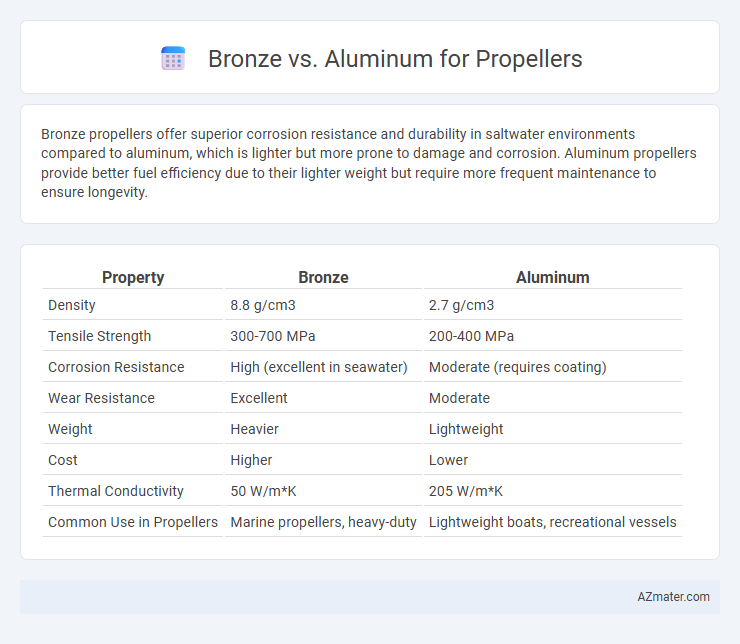Bronze propellers offer superior corrosion resistance and durability in saltwater environments compared to aluminum, which is lighter but more prone to damage and corrosion. Aluminum propellers provide better fuel efficiency due to their lighter weight but require more frequent maintenance to ensure longevity.
Table of Comparison
| Property | Bronze | Aluminum |
|---|---|---|
| Density | 8.8 g/cm3 | 2.7 g/cm3 |
| Tensile Strength | 300-700 MPa | 200-400 MPa |
| Corrosion Resistance | High (excellent in seawater) | Moderate (requires coating) |
| Wear Resistance | Excellent | Moderate |
| Weight | Heavier | Lightweight |
| Cost | Higher | Lower |
| Thermal Conductivity | 50 W/m*K | 205 W/m*K |
| Common Use in Propellers | Marine propellers, heavy-duty | Lightweight boats, recreational vessels |
Introduction: Comparing Bronze and Aluminum Propellers
Bronze propellers offer superior corrosion resistance and durability, making them ideal for saltwater applications and heavy-duty marine environments. Aluminum propellers provide a lightweight, cost-effective alternative with faster acceleration and improved fuel efficiency, suited for recreational boating and freshwater use. Evaluating factors such as strength, weight, corrosion resistance, and cost is essential when choosing between bronze and aluminum propellers for optimal performance.
Material Composition and Properties
Bronze propellers are primarily composed of copper and tin, sometimes with small amounts of phosphorus or aluminum, offering high corrosion resistance and excellent durability in marine environments. Aluminum propellers consist mainly of aluminum alloys, providing lighter weight and improved fuel efficiency but with lower strength and reduced resistance to impact and abrasion compared to bronze. The material composition directly influences propeller performance, where bronze excels in longevity and toughness, while aluminum offers cost-effective solutions with enhanced speed and maneuverability.
Weight Differences and Performance Impact
Bronze propellers, typically denser and heavier than aluminum, provide increased durability and resistance to corrosion but add significant weight to the vessel, impacting fuel efficiency and speed. Aluminum propellers offer a lightweight alternative that enhances acceleration and maneuverability by reducing overall mass but may sacrifice some longevity and resistance to damage. The choice hinges on balancing performance needs with maintenance considerations, where aluminum boosts responsiveness and bronze ensures robust, long-term reliability.
Corrosion Resistance in Marine Environments
Bronze propellers exhibit superior corrosion resistance in marine environments due to their natural ability to form a protective patina that inhibits further oxidation. Aluminum propellers, while lighter and less expensive, are more prone to galvanic corrosion, especially when in contact with other metals and saltwater. Maintenance and sacrificial anodes are often required for aluminum to enhance durability against corrosion.
Durability and Lifespan
Bronze propellers offer superior durability due to their high resistance to corrosion, especially in saltwater environments, resulting in a longer lifespan typically exceeding 10 years with proper maintenance. Aluminum propellers are lighter and more cost-effective but tend to wear faster and are more prone to damage from impacts and corrosion, leading to a shorter lifespan usually around 3 to 5 years. The choice between bronze and aluminum hinges on the balance between initial cost and long-term durability, with bronze favored for longevity in harsh marine conditions.
Maintenance Requirements
Bronze propellers demand regular inspection for corrosion and marine growth due to their susceptibility to electrochemical reactions in saltwater, requiring periodic cleaning and protective coatings to maintain performance. Aluminum propellers generally require less maintenance since they resist corrosion better but may need more frequent repairs or replacements after mechanical damage due to their lower durability. Proper maintenance of both materials involves routine checks and timely repairs to ensure optimal efficiency and longevity.
Cost Analysis: Bronze vs Aluminum
Bronze propellers generally have higher upfront costs due to expensive raw materials and complex casting processes, while aluminum propellers offer a more cost-effective alternative with lower material and manufacturing expenses. Maintenance costs for bronze can be higher because of corrosion resistance treatments, whereas aluminum requires more frequent replacement due to lower durability in harsh marine environments. Over time, aluminum propellers may incur greater total costs despite their initial affordability, making bronze a more economical choice for long-term use.
Efficiency and Fuel Consumption
Aluminum propellers offer lighter weight and improved fuel efficiency due to reduced drag and inertia, enhancing overall vessel performance. Bronze propellers provide superior durability and corrosion resistance, maintaining efficiency over longer periods in harsh marine environments. Choosing between bronze and aluminum impacts fuel consumption by balancing initial efficiency gains against long-term performance stability and maintenance needs.
Application Suitability: Choosing the Right Material
Bronze propellers offer superior corrosion resistance and durability, making them ideal for saltwater applications and commercial vessels where long-term strength is critical. Aluminum propellers provide lightweight performance and cost-effectiveness, suitable for freshwater boats and recreational use with moderate stress conditions. Selecting between bronze and aluminum hinges on the operating environment, load demands, and maintenance expectations to ensure optimal propeller efficiency and lifespan.
Conclusion: Which Propeller Material is Best?
Bronze propellers offer superior durability, corrosion resistance, and repairability, making them ideal for long-term use in saltwater environments and heavy-duty applications. Aluminum propellers provide lightweight performance, cost efficiency, and increased fuel economy, best suited for smaller boats and freshwater use. Selecting the best propeller material depends on vessel size, operating conditions, and budget, with bronze preferred for strength and longevity, while aluminum serves well for affordability and speed.

Infographic: Bronze vs Aluminum for Propeller
 azmater.com
azmater.com